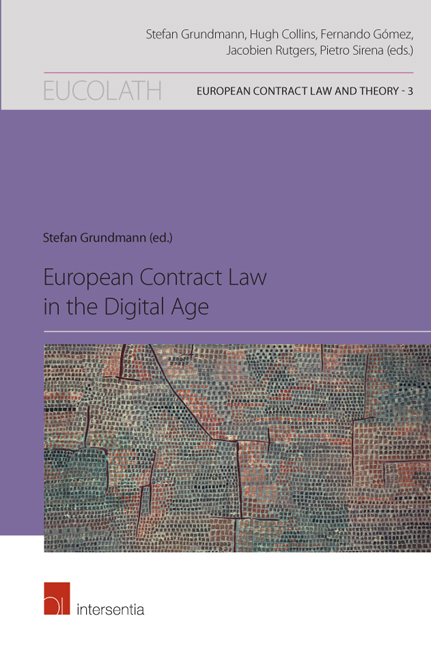Book contents
- Frontmatter
- Contents
- Table of Cases
- List of Authors
- PART I The Overall Architecture
- Part II Institutional Framework – Platforms, Regulation Issues, Global Surroundings
- Part III Digital Formation of Contract – More Virtual and More Formalised
- The E-Commerce Directive, Consumer Transactions, and the Digital Single Market – Questions of Regulatory Fitness, Regulatory Disconnection and Rule Redirection
- Connected Contracts Reloaded – Smart Contracts as Contractual Networks
- The Silk Road Revisited – Money Transactions Inside the Bitcoin System
- Part IV Development and Implementation of Contract – More Digital, More Liquid
- Part V Digital Objects of Contract – CESL II and More
- Index
- European Contract Law and Theory Series
The E-Commerce Directive, Consumer Transactions, and the Digital Single Market – Questions of Regulatory Fitness, Regulatory Disconnection and Rule Redirection
from Part III - Digital Formation of Contract – More Virtual and More Formalised
Published online by Cambridge University Press: 11 October 2018
- Frontmatter
- Contents
- Table of Cases
- List of Authors
- PART I The Overall Architecture
- Part II Institutional Framework – Platforms, Regulation Issues, Global Surroundings
- Part III Digital Formation of Contract – More Virtual and More Formalised
- The E-Commerce Directive, Consumer Transactions, and the Digital Single Market – Questions of Regulatory Fitness, Regulatory Disconnection and Rule Redirection
- Connected Contracts Reloaded – Smart Contracts as Contractual Networks
- The Silk Road Revisited – Money Transactions Inside the Bitcoin System
- Part IV Development and Implementation of Contract – More Digital, More Liquid
- Part V Digital Objects of Contract – CESL II and More
- Index
- European Contract Law and Theory Series
Summary
ABSTRACT
This chapter poses two principal questions. First, even if, at the time of its enactment, Directive 2000/31/EC (the E-Commerce Directive) was right to treat off -line and on-line transactions as functionally, contextually, and normatively equivalent, does that continue to be the appropriate regulatory view? Secondly, how should regulators view the distinction between on the one hand transactions that are made (off -line or on-line) between business suppliers and consumer contractors and on the other, automated transactions for the supply of goods or services to consumers?
Responding to the first of these questions, it is suggested that there are reasons for thinking that the context for on-line transactions is materially different from that for off -line transactions, as a result of which the balance of contracting power and influence in on-line transactional environments has changed, to the detriment of consumers. Accordingly, for the sake of consumer protection, the time is right to review the prevailing regulatory view.
Responding to the second question, it is suggested that where transactions for routine consumption of goods and services are fully automated, consumer contractors seem to be reduced to mere consumers. Arguably, this represents a radically new context for consumption that invites a bespoke regulatory response. Moreover, to the extent that consumer transactions are technologically mediated or managed, this implies that the guidance provided by rules will not be directed at those who supply consumer goods or services or at those who consume such goods and services so much as at those who design and supply the systems that manage those transactions.
INTRODUCTION
Twenty years ago, when UNCITRAL published its Model Law on Electronic Commerce, there was felt to be an urgent need to set out ‘internationally acceptable rules aimed at removing legal obstacles and increasing legal predictability for electronic commerce.’ In particular, it was thought to be important to provide ‘equal treatment to paper-based and electronic information’. In Europe, too, this sense of urgency and importance was shared. If small businesses in Europe were to take advantage of the opportunity afforded by emerging Information and Communication Technologies to access new markets, and if consumers were to be sufficiently confident to order goods and services on-line, it needed to be absolutely clear that e-transactions (no less than ‘traditional’ contracts) were recognised as legally valid and enforceable.
- Type
- Chapter
- Information
- European Contract Law in the Digital Age , pp. 165 - 204Publisher: IntersentiaPrint publication year: 2018
- 4
- Cited by



